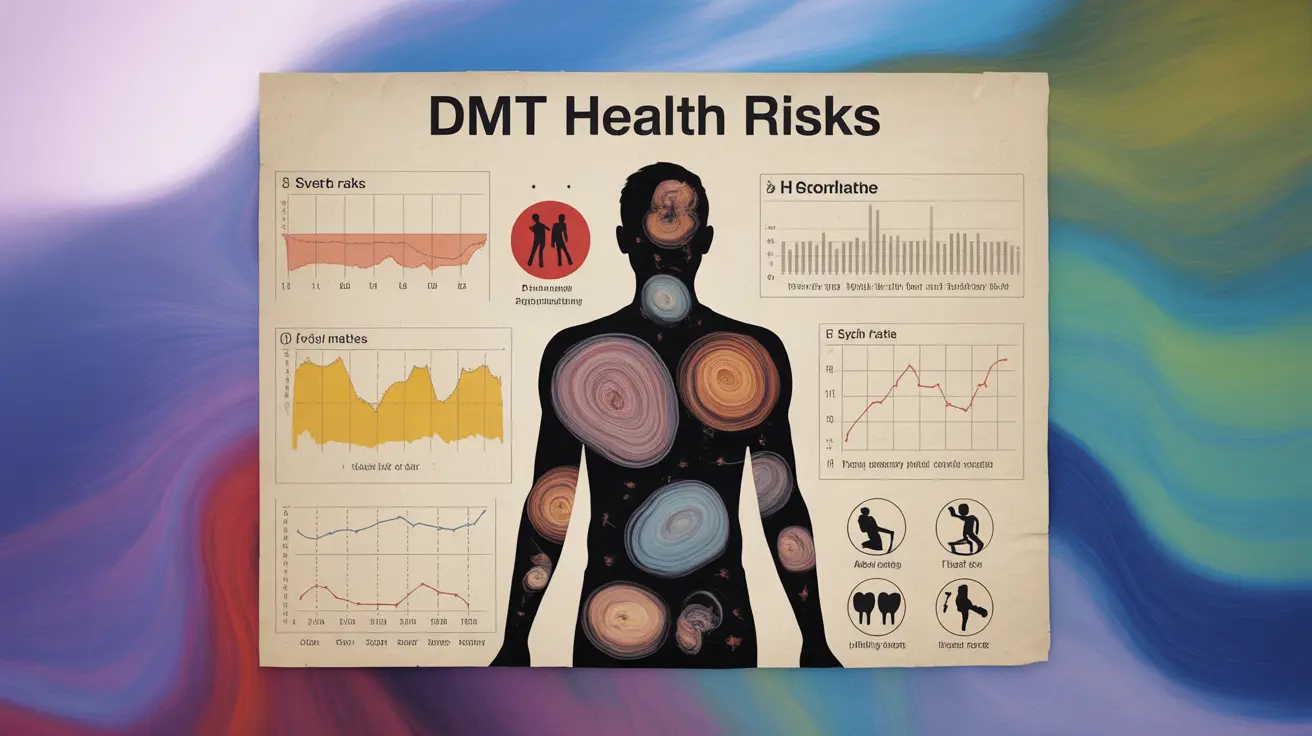DMT (N,N-Dimethyltryptamine) is a powerful hallucinogenic compound that has gained increased attention in recent years. While some people seek it for spiritual experiences or psychological exploration, understanding its potential dangers and health risks is crucial for harm reduction and informed decision-making.
This comprehensive guide examines the various risks associated with DMT use, including physical and psychological effects, potential complications for specific health conditions, and important safety considerations.
Physical Health Risks of DMT
DMT can cause significant changes in body function that may pose serious health risks. The most immediate physical effects include:
- Elevated blood pressure
- Increased heart rate
- Rapid breathing
- Elevated body temperature
- Dilated pupils
- Dizziness and disorientation
These physiological changes can be particularly dangerous for individuals with pre-existing cardiovascular conditions or other health concerns. The intensity of these effects can vary significantly between individuals and may be unpredictable.
Psychological and Mental Health Impacts
The psychological effects of DMT can be profound and potentially destabilizing, especially for those with underlying mental health conditions. Common psychological risks include:
- Severe anxiety or panic attacks
- Temporary psychosis
- Dissociative experiences
- Overwhelming emotional responses
- Difficulty integrating the experience
- Potential triggering of latent mental health conditions
These effects can be particularly challenging due to the intense nature of DMT experiences and their potential to surface deep psychological material.
Drug Interactions and Combination Risks
Combining DMT with other substances can significantly increase health risks. Particularly dangerous interactions can occur with:
- Antidepressants (especially MAOIs)
- Other psychedelics
- Stimulants
- Alcohol
- Prescription medications
These combinations can lead to potentially life-threatening conditions, including serotonin syndrome and severe cardiovascular complications.
Long-term Effects and Chronic Use
While research on long-term DMT use is limited, several potential risks have been identified:
- Persistent perceptual changes
- Integration difficulties
- Psychological dependence
- Impact on mental health stability
- Potential memory and cognitive effects
Regular use may increase the likelihood of experiencing these long-term effects and could potentially lead to more serious complications.
Risk Reduction Strategies
For those who choose to use DMT despite its risks, certain harm reduction practices may help minimize potential dangers:
- Thorough medical and mental health screening beforehand
- Having a trusted, sober companion present
- Creating a safe, controlled environment
- Starting with lower doses
- Avoiding combinations with other substances
- Having emergency contacts readily available
Frequently Asked Questions
Is DMT dangerous for people with heart or mental health problems?
Yes, DMT can be particularly dangerous for people with heart conditions or mental health issues. The substance can significantly increase heart rate and blood pressure, potentially causing serious cardiovascular complications. For those with mental health conditions, DMT may trigger or worsen symptoms, including anxiety, depression, or psychosis.
What are the common physical and psychological side effects of using DMT?
Common physical side effects include increased heart rate, blood pressure changes, dizziness, and nausea. Psychological effects can include intense hallucinations, altered perception of time and reality, anxiety, and potentially overwhelming emotional experiences.
Can mixing DMT with other drugs or medications increase health risks?
Yes, combining DMT with other substances can significantly increase health risks. Particularly dangerous interactions occur with MAOIs, antidepressants, and other psychoactive substances, potentially leading to severe medical emergencies like serotonin syndrome.
What are the long-term dangers or persistent effects of using DMT repeatedly?
Regular DMT use may lead to persistent perceptual changes, psychological integration difficulties, and potential impacts on mental health stability. While research is limited, there are concerns about long-term effects on cognitive function and psychological well-being.
How can someone reduce the risks if they choose to use DMT?
Risk reduction strategies include thorough health screening, having a sober companion present, creating a safe environment, starting with lower doses, avoiding drug combinations, and having emergency contacts ready. However, the safest approach is to avoid DMT use altogether, especially if you have underlying health conditions.




